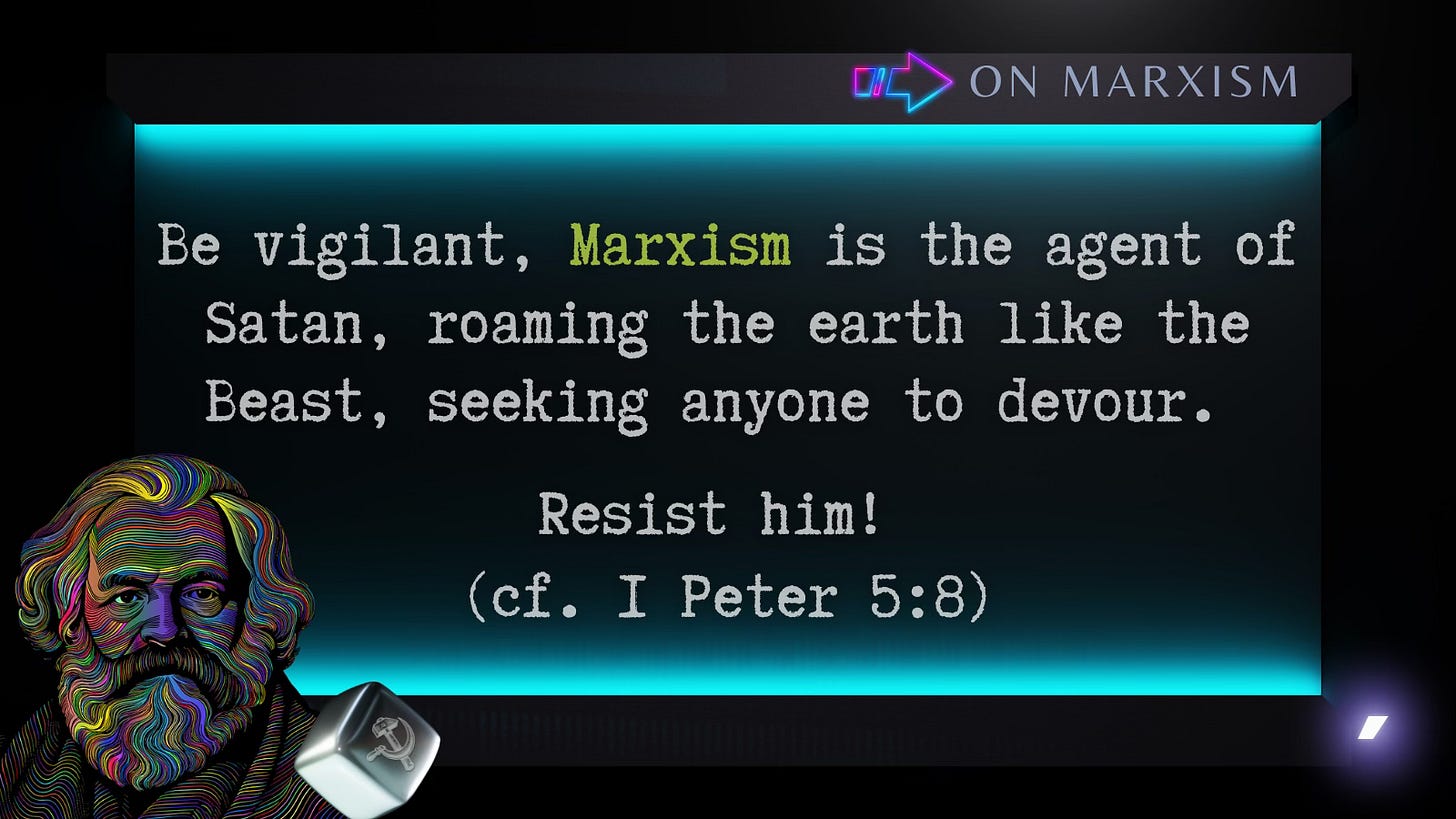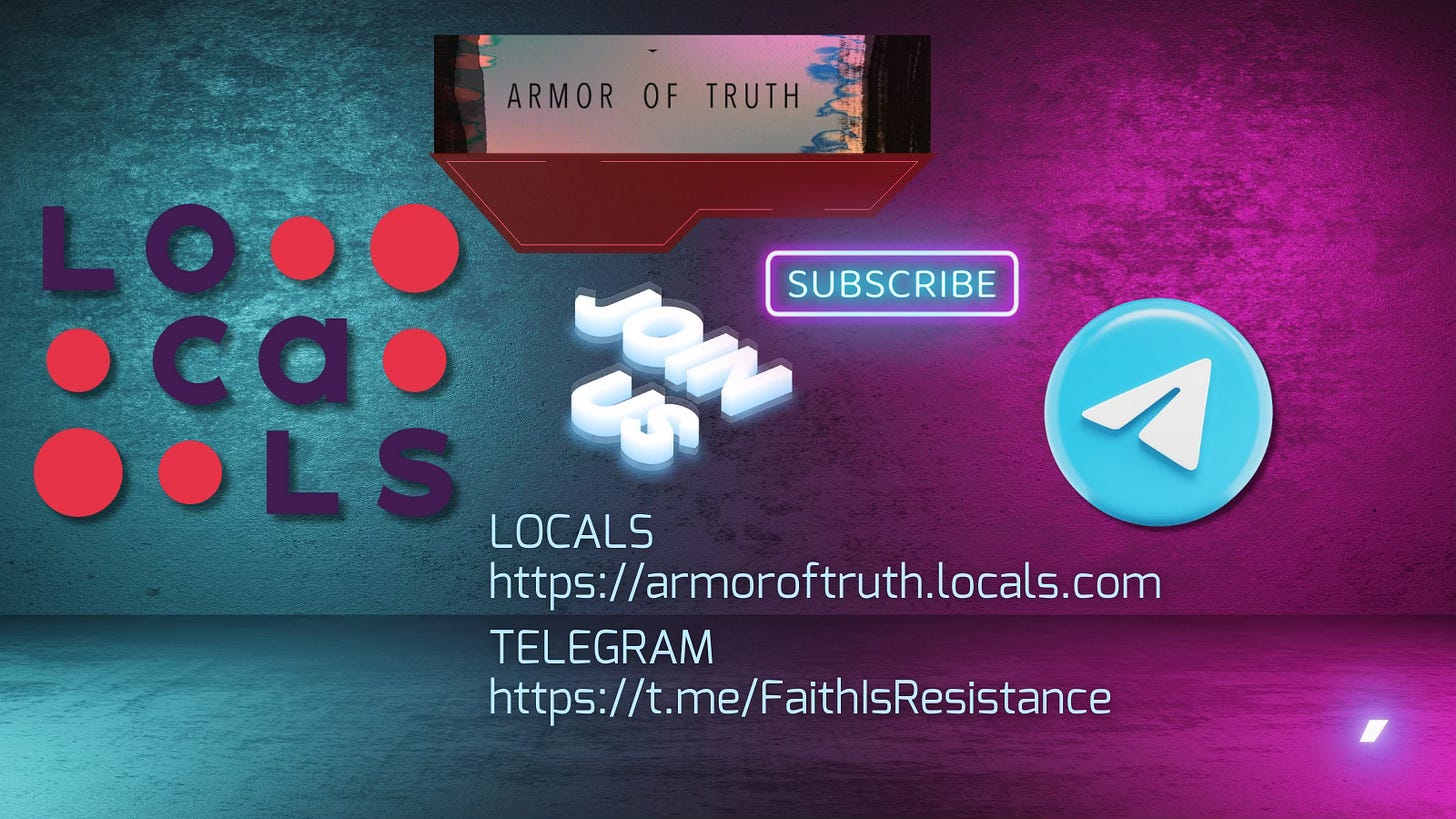Free Market Capitalism and Biblical Charity Are The Natural Enemies of Communism
Like the man of the house, who must provide for and protect his household, the leaders of our nation have a responsibility to the citizens of this nation-FIRST!
People often claim Christianity is comparable to socialism, or that Jesus surely would be a communist. They frequently refer to examples of Christian charity in the Bible as an argument for collectivism. For example, Paul wrote to the church at Corinth,
"Now concerning the collection for the saints: as I directed the churches of Galatia, so you also are to do. On the first day of every week, each of you is to put something aside and store it up, as he may prosper, so that there will be no collecting when I come.” (1 Corinthians 16:1-4)
There ya have it! Wouldn’t Karl Marx be proud? But, wait a minute… There’s a massive difference between the collectivism of Marx’s design and Christian charity. That same apostle wrote to the church at Rome,
"At present, however, I am going to Jerusalem bringing aid to the saints. For Macedonia and Achaia have been pleased to make some contribution for the poor among the saints at Jerusalem. For they were pleased to do it, and indeed they owe it to them. For if the Gentiles have come to share in their spiritual blessings, they ought also to be of service to them in material blessings." (Romans 15:25-27)
They were “pleased to do it.” They gave cheerfully and voluntarily. That is nothing like Karl Marx version collectivism where all wealth and property is held by the central planning department. But, before we present the bullet proof case for free markets over socialism, I think we need a bit more clarity on the biblical principles of charity.
Mayor of San Diego suburb say Federal Gov. & NGOs running a covert operation. This is an example of the communist coup currently occurring in America.
The Biblical Principles of Charity
Jesus is God and therefore has infinite resources. But the church on Earth is finite and made up of people who are limited in ability, knowledge, and resources; limited in gifts, time, money, intellect, etc… We are commanded to manage our blessings well.
“And let us not lose heart in doing good, for in due time we will reap if we do not grow weary. So then, while we have opportunity, let us do good to all people, and especially to those who are of the household of the faith.” (Galatians 6:9-10)
Paul is talking about bearing each other's burdens and serving those in the household of faith. Take note here: we must prioritize the household of faith. Compare that to what The apostle John wrote,
“A new commandment I give to you, that you love one another; as I have loved you, that you also love one another. By this, all will know that you are My disciples, if you have love for one another.” (John 13:34-35)
The church does not have infinite resources, which means as often as we, the church, the people of God, have opportunity we should seek to do good to all people. But, we have a command from God to prioritize the household of faith—first.
If we're doing good deeds for unbelievers, or migrants, or if we’re serving another church in a different county or country and it hinders our abilities or uses up our resources, time, or energy such that it limits or prevents us from fulfilling our first duty to our own household, we are wrong.
Matthew writes in chapter 25,
“‘Truly I say to you, to the extent that you did it to one of these brothers of Mine, even the least of them, you did it to Me.’”
Matthew 25 is about the Final Judgment for the goats and the reward for Christ’s sheep. There’s more to this passage than the commonly misapplied phrase “the least of these.” In the text that follows, Jesus lays out some harsh, actually horrifying words, for those who merely professed faith, but did not possess faith in Christ.
“Then He will also say to those on His left, ‘Depart from Me, accursed ones, into the eternal fire which has been prepared for the devil and his angels; for I was hungry, and you gave Me nothing to eat…’ Then they will answer, saying, ‘Lord, when did we see You…and did not take care of You?’ Then He will answer them, saying, ‘Truly I say to you, to the extent that you did not do it to one of the least of these, you did not do it to Me.’ And these will go away into eternal punishment, but the righteous into eternal life.” (Matthew 25: 41-46)
For those on Jesus’ right, mercy, and reward. For those on Jesus’ left, judgment and wrath. This judgment was based purely on their moral kindness, or lack thereof.
The Least of These
Who are “the least of these?” The culture says it is definitely the people on the margins, the poor, it’s the LGBT community, or it's the illegal immigrant. It is the migrants. It is all who are oppressed.
Is this correct? No, not exactly.
When Jesus says you visited me in prison, He means that you visited a Christian who's been wrongfully imprisoned for preaching the Gospel, you clothed a brother or sister in Christ who is impoverished and can't afford clothing, or you ministered to a Christian who had all their possessions stolen or confiscating under persecution for their faith… The Christian who is not under dire strain or persecution comes to the aid of the brother or sister who is and helps them, this is how we build the Kingdom—loving one another.
The bottom line is this: We can't forgive everybody's student loan debt, or provide free housing for every so-called “asylum seeker” (another manipulative term). We can't, in fact we must not, attempt to feed everyone else in town at the expense of our own household—and we can’t allow everyone into our country.
Paul explains in Galatians 6, “as often as you have opportunity.” Our opportunities in this life are finite and limited, we do not possess endless resources to give away.
Because we are being perfected, and not yet perfect, we struggle with sins like pride, greed, and idolatry. We’ve had it very good for a very long time and we love pleasure and comfort and convenience.
But, even if I could be a perfect Christian, with no greed, my resources and opportunity are still finite. I only have so much in my bank account, in my cupboard, to give away. I only have so much time to spend and my house can only hold so many people.
As with individuals, so with our nation: Our resources are not infinite
Our leaders, starting with the man of the house, have a responsibility to protect our borders, the borders of our homes, our communities and our counties. We are to uphold the rule of law, and enforce the laws on the books.
And just like the man of the house must provide for an protect his household, and like a pastor is responsible for keeping his flock safe, the leaders of our nation have a responsibility to the citizens of our nation first.
As Christians, we will try to do our best to love all people, but especially our own people. When a man is drawn away from his own and starts loving someone else's kids, tries to clothe all the kids on his neighborhood but does not bother to buy clothes for his own children, doesn’t keep his own children safe from intruders, it’s not just wrong, it’s a misuse of the gifts God has provided and there is a strong condemnation for that kind of behavior in the Bible.
The Rules
The context of 1 Timothy 5:3-8 is the provision for widows, very specific rules for how charity should be done.
“Honor widows who are widows indeed, but if any widow has children or grandchildren, they must first learn to practice piety in regard to their own family and to make some return to their parents; for this is acceptable in the sight of God. Now she who is a widow indeed and who has been left alone, has fixed her hope on God and continues in petitions and prayers night and day. But she who lives in self-indulgence is dead even while she lives. And command these things as well, so that they may be above reproach. But if anyone does not provide for his own, and especially for those of his household, he has denied the faith and is worse than an unbeliever.”
There is a very clear condition placed on who we should help and who we should not. The first rule is to let her grandchildren work and support her, teach them to be obedient to Christ and honor their family and elders. This is how financial support and charity are given in a dignified and honorable way.
In the days the New Testament was written, there was no social security, and there were no government assistance programs. A widow was especially vulnerable. Elderly widows without support were even more vulnerable. But the Scripture also says that we must evaluate the situation first, to ensure that the woman is really a widow and not a con artist or scammer.
That is exactly how we must treat a mass of people who knowingly break international laws and the laws of our nation. We evaluate their need before we start giving out charity. And we do not allow wicked rulers to take advantage of our good nature, and we must never feel embarrassed or ashamed about the blessings God has bestowed on America.
Worse Than An Unbeliever
Certainly, the local church is a place where the poor and needy should be able to come for financial help without being taken advantage of. But, we must also be fully aware that It is very common for grifters to contact churches or individual Christians and give a big sad story, to make an appeal to what they believe are the principles of Christian love, to ask for money, or for this or that.
Our duty is to evaluate the situation. To see if this is truly a widow, or if it’s truly someone in genuine need and not a grifter. More often than not, upon further review, these charity cases are actually just folks trying to get something without having to earn it.
“For the Scripture says, ‘YOU SHALL NOT MUZZLE THE OX WHILE IT IS THRESHING,’ and “THE LABORER IS WORTHY OF HIS WAGES.” (1 Timothy 5:18)
Man’s idea of charity is different than God’s. In God’s plan, the normal source of providing for the needy is not through the local church, but through hard work.
“Stay at the same house, eating and drinking whatever you are offered. For the worker is worthy of his wages. Do not move around from house to house.” (Luke 10:7)
In 2 Thessalonians 3 (vv. 6-15), Paul discusses this concept again.
“10b if anyone is not willing to work, neither let him eat. 11 For we hear that some among you are walking in an unruly manner, doing no work at all, but acting like busybodies. 12 Now such persons we command and exhort in the Lord Jesus Christ, that working with quietness, they eat their own bread. 13 But as for you, brothers, do not lose heart in doing good. 14 And if anyone does not obey our word in this letter, take special note of that person to not associate with him, so that he will be put to shame. 15 And yet do not regard him as an enemy, but admonish him as a brother.”
In verse 8 of 1 Timothy 5, Paul says as plainly as can be communicated, there is a priority as to where our finite resources will be applied. If a man misuses the blessing of gain the Lord has given by neglecting those directly in his charge, he is “worse than an unbeliever.”
If a man won't provide for the members of his own house, he's worse than an unbeliever, he has denied the faith.
The principle of general Equity applies to this command as well. Romans 13 says that all government is ordained, either appointed or allowed by God, to reward good and to restrain and punish evil. Therefore the Civil magistrate, the local, state, and in our case, federal government, is also held to this very same standard.
From the security guard to the sheriff, from the principal at the elementary school to the mayor, to the governor, Congressman, Senator, and President, each is called to serve in that capacity as a nurturing father to the citizens under his rule.
If he fails to fulfill this duty by providing for foreigners and the unvetted masses who show up to claim his resources, charity, money, food, clothing, healthcare, etc., at the cost of the people of his house if he fails to provide for his own people first, then he is worse than an unbeliever, and he has denied the faith.
Sadly, but in all honesty, Joe Biden, Kamala Harris, and many, many more from both sides of the aisle are traitors to the United States of America. What’s could be more horrifying than that? They’re all as lost as a ball in tall grass.
Pray for their souls! For we want to see them all in heaven one sweet day when we can forget about all of this wickedness and strife that happened in the world.
Free Market Capitalism is Morally Superior To Communism
Free market capitalism, grounded in the principles of private property, individual responsibility, and voluntary charity, is a more biblically sound economic system than economic communism, which relies on forced redistribution of wealth by a central planner the government and undermines the biblical principles of stewardship and charity.
Forced Redistribution:
Economic communism, by its very nature, involves the forced redistribution of wealth by the government. This contradicts the biblical principle of private property and undermines the concept of stewardship. By stripping individuals of their right to own and manage property, communism erodes personal responsibility and the incentive to work diligently and wisely.
Coercion versus Voluntarism:
Unlike the voluntary charity emphasized in Scripture, communism relies on coercion to redistribute wealth. This not only negates the personal joy and spiritual growth that comes from voluntary giving but also fosters resentment and a sense of entitlement. The biblical model of charity is grounded in love and free will, which cannot be replicated in a system that mandates economic equality through force.
Undermining Human Dignity:
By collectivizing ownership and control of resources, economic communism reduces individuals to mere cogs in a state-controlled machine. This undermines the biblical view of human dignity, which affirms the unique value of each person as created in the image of God (Genesis 1:27). Capitalism, by contrast, acknowledges and respects the individuality and creativity of each person, allowing them to pursue their God-given potential.
Biblical Principles Supporting Free Market Capitalism
Private Property:
The Bible consistently affirms the right to private property. In the Ten Commandments, the injunctions "You shall not steal" (Exodus 20:15) and "You shall not covet" (Exodus 20:17) presuppose the legitimacy of personal ownership. These commandments recognize that individuals have a God-given right to own property and that this property is not to be unjustly taken by others, whether by theft or through coercive means.
Stewardship and Individual Responsibility:
Scripture emphasizes the importance of stewardship, where individuals are called to manage their resources wisely. The Parable of the Talents (Matthew 25:14-30) illustrates the principle of personal responsibility, where servants are entrusted with resources and are expected to invest and grow them. This parable supports the idea of free enterprise, where individuals are encouraged to use their talents and resources to generate wealth, reflecting the inherent dignity of work and the responsibility of each person to contribute to society.
Voluntary Charity:
Christian charity is voluntary, not coerced. The early church's practice of sharing resources (Acts 2:44-45) was a voluntary act of love, not a state-mandated redistribution. Paul highlights the importance of giving from a willing heart, stating that "each one must give as he has decided in his heart, not reluctantly or under compulsion, for God loves a cheerful giver" (2 Corinthians 9:7). This principle underscores the voluntary nature of charity, which is essential for maintaining the integrity and spirit of Christian giving.
Loving Truth
Loving truth is about much more than tearing down bad arguments. We’re commanded to build one another up by being constructive, encouraging discernment and growth in the understanding of truth, always pointing others back to the foundational truths of Scripture and the gospel, and encouraging them away from the vain philosophies of those who know no better.
In 2 Corinthians 10:13, Paul gives some incredibly helpful advice to be careful and thoughtful to maintain a spirit of humility, recognizing our total dependence on God's grace and truth at all times.
"Look carefully then how you walk, not as unwise but as wise, making the best use of the time, because the days are evil." (Ephesians 5:15-16)
We need to be grounded in the wisdom of Scripture so that we can discern between what is true and what is simply a vain philosophy. This is how we become wise, and this is how we remain vigilant and aware of the deceptive influences and spiritual threats that have us hemmed in on every side.
The days are evil, and even the most well-meaning person can be manipulated and/or manipulative.
Deception often disguises itself as good. Satan and his servants will often appear as angels of light (1 Cor. 11:13-15). People will disguise themselves as ministers for the good. They will proclaim that they are fighting darkness, saving the world from tyranny and lies. The demonic will almost always manifest itself as something the human heart finds appealing or reaffirming.
Whenever we experience confusion or fear, our first response must be to examine ourselves. The apostle to the Gentiles encouraged the wild Corinthian Christians to do just that, “Examine yourselves, to see whether you are in the faith. Test yourselves…” (2 Corinthians 13:5). Then he says, “Or do you not realize this about yourselves, that Jesus Christ is in you?”
Is Jesus Christ in you today? Do you belong to the King of Kings? If the answer is “yes,” what are you worried about?
James encourages Christians under tremendous persecution to not doubt, explaining that one who doubts, is double-minded, literally “double-souled,” and is likely to be deceived, thrown around by the winds of change, and fall into traps.
James encouraged persecuted Christians, if you don’t understand what’s happening and if you feel confused by what you are seeing and hearing, pray and “ask God, “who gives generously” because our God is the God of the open hand, not the God of the clenched fist.
After a sincere account of ourselves, when we understand our rebellion and our absolute dependence on God, then we can ask the Lord to help us overcome these influences and urges. We will have no need of anxiety and fear; for they build nothing, only destroy.
If you want answers and comfort, the place to begin and end is in His word. True wisdom will always be consistent with God’s word. Ask God with a humble heart, trusting in His sovereign rule and providential action, and God will give you far more than you expect or deserve. He will give you peace.
Brad Ward, Director, Armor of Truth
For a free Bible and tracts (available to ship in the U.S.A. only) please email us
Download the Armor of Truth Mobile App Free
NEW! AoT Locals
NEW! AoT Telegram
Armor of Truth, Inc is a 501(c)(3) Non Profit Organization
Donations are tax deductible
By supporting Armor of Truth you are helping to reach thousands of people daily with the Gospel of Jesus Christ and encouragement to persevere in a world that is hostile to the gospel. Please consider making a donation to help support this mission.
Support Armor of Truth, official donation page: Donate
CashApp $aotmin










